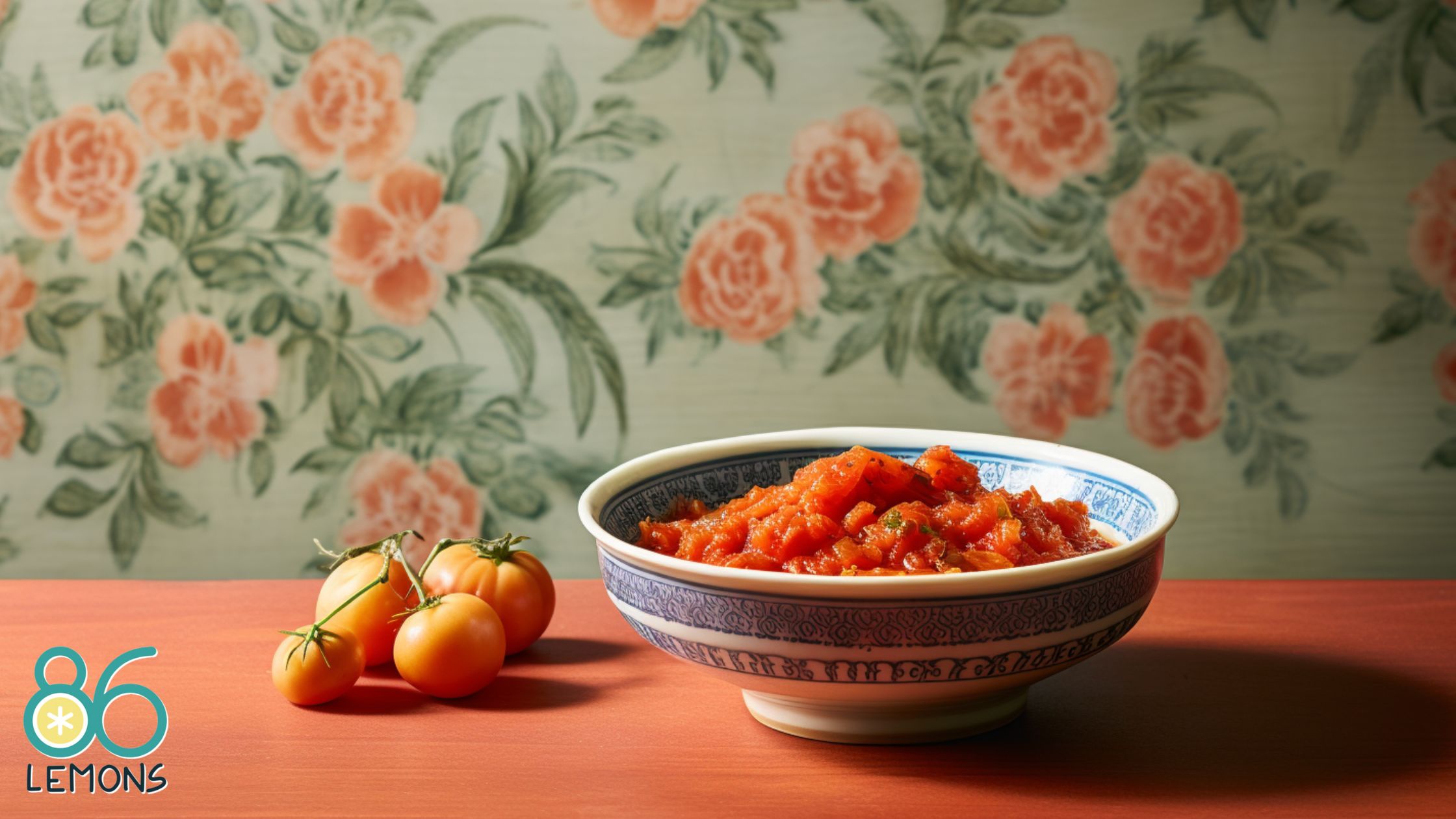Marinara sauce, known for its vibrant tomato base and aromatic herbs, is a staple in many cuisines worldwide. When exploring plant-based options, you might wonder if this beloved sauce fits your vegan lifestyle.
Fortunately, traditional marinara sauce is typically crafted from tomatoes, garlic, herbs, and onions, making it a vegan-friendly option for your pasta dishes, pizzas, and more.
At home, you have the complete freedom to whip up a batch of marinara using only plant-based ingredients, ensuring it aligns with your vegan diet. As you navigate your culinary journey with these best easy vegan cookbooks, you might find that store-bought varieties of marinara sauce can vary; some may include non-vegan additions like cheese or meat flavorings.
Vigilance with labels or homemade versions can keep your marinara sauce vegan without compromising taste.
Key Takeaways
- Marinara sauce is traditionally vegan, made with simple plant-based ingredients.
- Homemade marinara sauce allows full control over the ingredients, catering to a vegan diet.
- Store-bought marinara may require label checking to avoid non-vegan ingredients.
What Is Marinara Sauce?
When you think of a simple yet robust pasta sauce, marinara sauce likely comes to mind. This traditional sauce combines a few staple ingredients to create a versatile condiment.
History and Origins
Marinara sauce originated in Italy, with some sources suggesting sailors’ wives made it upon their return from sea. Tomatoes, introduced to Europe from the Americas, are the foundation of this sauce, which gained popularity for its ease of preparation and ability to be stored for long sea voyages.
Classic Ingredients
Typically, diced tomatoes, crushed tomatoes, or tomato paste form the marinara sauce base, giving it a distinct, fresh tomato flavor. Garlic, onions, and herbs like fresh basil and oregano are sautéed in olive oil to release their flavors before being combined with the tomatoes.
The simplicity of these ingredients makes homemade marinara sauce delicious and naturally vegan.
Modern Variations
Contemporary takes on marinara sauce might include a variety of spices and additional ingredients. Some recipes call for a dash of wine for depth, while others might add sugars to balance the acidity of the tomatoes.
If you’re exploring store-bought sauces, always check the label, as some may include non-vegan ingredients.
Is Marinara Sauce Vegan?
Marinara sauce is a staple in many diets and cuisines, often embraced by vegans for its plant-based ingredients. However, not all marinara sauces are created equal; some may contain non-vegan additives you’ll need to watch out for.
Identifying Non-Vegan Additives
When examining store-bought marinara sauce, it’s essential to be vigilant about certain additives that are not vegan-friendly. Non-vegan additives may include animal-derived ingredients like cheeses, among which parmesan is a common offender.
Other subtler additives to look out for are citric acid and monosodium glutamate (MSG), which, while not always derived from animal sources, can sometimes be suspect. Always check the label to ensure that these additives are plant-based.
Common Vegan Substitutes
If you’re making marinara sauce at home and want to keep it vegan-friendly, consider using nutritional yeast as a substitute for parmesan to get that similar cheesy flavor. Nutritional yeast is a staple in vegan cooking, providing a rich, umami taste that complements marinara sauce’s natural, tangy flavor.
For a store-bought sauce, brands that market themselves as specifically vegan should typically use vegan parmesan or exclude cheese altogether.
Making Vegan Marinara Sauce At Home
Creating vegan marinara sauce in your kitchen is simple and allows you to control the ingredients for the best flavor and health benefits. You’ll discover that with a few easy steps and the proper preservation methods, you can enjoy this sauce with your favorite dishes anytime.
Simple Homemade Recipe
To start your homemade marinara sauce, gather the following ingredients:
- Fresh tomatoes (6 medium-sized or two cans of crushed tomatoes)
- 2 tablespoons of extra virgin olive oil
- 3 minced garlic cloves
- 1 small diced onion
- Salt and pepper to taste
- Fresh or dried herbs like basil and oregano
Begin by sautéing the garlic and onion in olive oil until tender and fragrant. Next, add the tomatoes, roughly chopped if fresh, and cook until they break into a sauce.
Continue to simmer for about 20 to 30 minutes, and then blend the sauce using a blender to achieve your desired texture, either smooth or chunky. Remember, simple is often best when it comes to recipes like this.
Tips for Best Flavor and Texture
Use fresh tomatoes and extra virgin olive oil for the best flavor. Try sautéing your onions until they’re golden brown, which brings out their sweetness, and let your sauce simmer long enough to let the flavors meld together. If your sauce is too acidic, a pinch of sugar can balance it out.
Consider adding finely chopped vegetables or mushrooms to attain a hearty texture. When blending your sauce, you can choose to leave it a bit chunky or blend it until smooth, depending on your preference.
Preservation and Storage
To keep your vegan marinara sauce fresh, let it cool after cooking and then store it in an airtight container; it will stay in the fridge for up to a week. If you want to keep it longer, freezing is an excellent option.
Use freezer bags or containers, leaving some room for expansion, and your homemade marinara sauce can be stored in the freezer for 3-4 months. When ready to use it, thaw it in the fridge or a warm water bath before reheating.
Now you’re ready to enjoy your vegan marinara sauce as a dip, with pasta, or in any dish that calls for a robust tomato sauce, like this tasty vegan Brazilian rice and beans!
Vegan Cooking with Marinara Sauce
Marinara sauce’s versatility makes it a staple in vegan cooking, especially for crafting Italian-inspired dishes. Its plant-based composition marries well with various ingredients, enhancing flavors without the need for animal products.
Pasta and Casseroles
Tossing spaghetti with a rich marinara sauce is a timeless choice when preparing a quick and satisfying meal. It’s a simple dish that guarantees a delightful experience.
Turning to casseroles, a vegan lasagna layered with marinara, eggplant, vegan meatballs, and plant-based cheese alternatives results in a comforting dish perfect for family dinners or potlucks.
Pizza and Appetizers
Offering more than just a pasta sauce, marinara can also serve as an excellent pizza sauce spread over your homemade dough and topped with your favorite veggies and vegan cheeses. It’s also great for dipping, so your next plate of breadsticks or crispy cauliflower bites is incomplete without a side of vegan sauce to elevate the flavors.
Customizing Marinara Sauce for Dietary Needs
Creating a marinara sauce that accommodates your dietary requirements can be fun and easy. By making a few simple adjustments, you can ensure your pasta sauce is vegan and fits various other dietary preferences.
Gluten-Free and Allergen Considerations
If you must avoid gluten or certain allergens, your marinara sauce can still be robust and flavorful. Ensure that any added ingredients, like seasonings, are certified gluten-free.
Add gluten-free and allergen-friendly components such as olives and capers for a chunky and hearty texture. Choosing fresh herbs can enhance flavor without adding gluten or common allergens.
Low-Carb and Keto Options
Maintaining a low-carb or keto diet doesn’t mean you have to give up on a flavorful marinara sauce. Replace sugar with keto-friendly sweeteners if needed, or simply let the natural sweetness of tomatoes shine.
Amp up the taste with various seasonings—consider adding a dash of red pepper flakes for a spicy marinara twist. And for a more decadent sauce without the carbs, stir in some oil-free vegan ranch dressing to reach that creamy consistency.
Buying Vegan Marinara Sauce
Understanding labels is crucial When scouring the supermarket aisles for a marinara sauce that aligns with your vegan diet. Some store-bought marinara sauces may contain non-vegan additives, so here’s how to make an informed decision.
Reading Labels for Vegan Products
Label reading is essential for maintaining a vegan diet. Ingredients to look out for include:
- Meat or cheese flavorings: some sauces use these for enhanced taste.
- Sugar processed with bone char: this is not vegan, although it is not always explicitly stated.
- Modified food starch: can be derived from various sources, including wheat, corn, and potatoes, but sometimes from fish or other animals.
When you’re in the label-reading zone, look for a vegan certification or a ‘suitable for vegans’ label, which can save you time and assure you of the product’s vegan status.
Recommended Brands and Alternatives
Several brands offer vegan-friendly marinara sauces. Here are a few you might consider:
- Organico Bello: Known for its organic, non-GMO ingredients and hearty flavor,
- Cucina Antica: Their garlic marinara is a fan favorite and certified vegan.
If you enjoy dining out, ask the restaurant about their sauce; they often use vegan-friendly recipes. For those times when the perfect sauce proves elusive, consider homemade alternatives using crushed tomatoes, garlic, onions, and herbs to ensure a 100% vegan result.
Homemade sauce guarantees vegan ingredients and lets you tailor the flavor to your taste.
Sustainability and Health Benefits
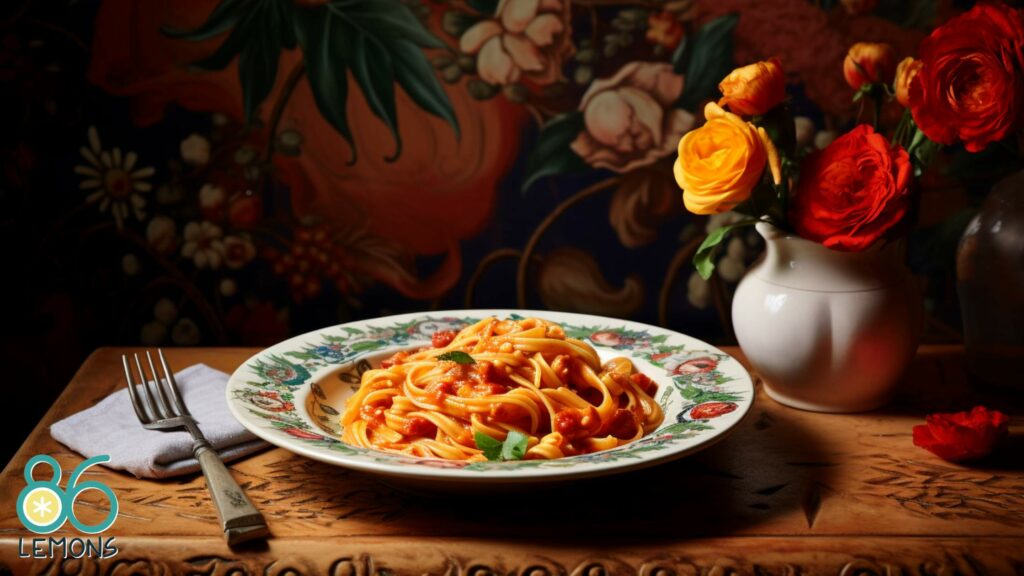
Marinara sauce, often celebrated for being vegan, brings a trove of sustainability and health benefits to your table. Here, you’ll explore the environmental perks of plant-based sauces and the nutritional upsides of their ingredients.
Environmental Impact of Vegan Sauces
When you opt for a marinara sauce made with plant-based ingredients like tomatoes, garlic, and herbs, you choose a product with a generally lower carbon footprint than its non-vegan counterparts. Ingredients like olive oil, onions, and mushrooms are often cultivated through less resource-intensive farming practices than animal-based products, helping to mitigate soil depletion and promoting biodiversity.
Moreover, sourcing ingredients such as sea salt and pepper from sustainable producers can contribute to conserving natural habitats.
Nutritional Advantages of Plant-Based Ingredients
Marinara sauce offers more than just a delicious accompaniment to your meals; its vegetable-based composition is brimming with vital nutrients. For instance, tomatoes are a fantastic source of antioxidants like lycopene, vitamin C, and potassium. Other common ingredients like onions and carrots provide dietary fiber, vitamin A, and a variety of beneficial polyphenols.
Adding a dash of olive oil enhances the flavor and incorporates healthy monounsaturated fats into your diet. A well-crafted marinara balances taste and health benefits with sea salt or salt in moderation.
Exploring World Cuisines
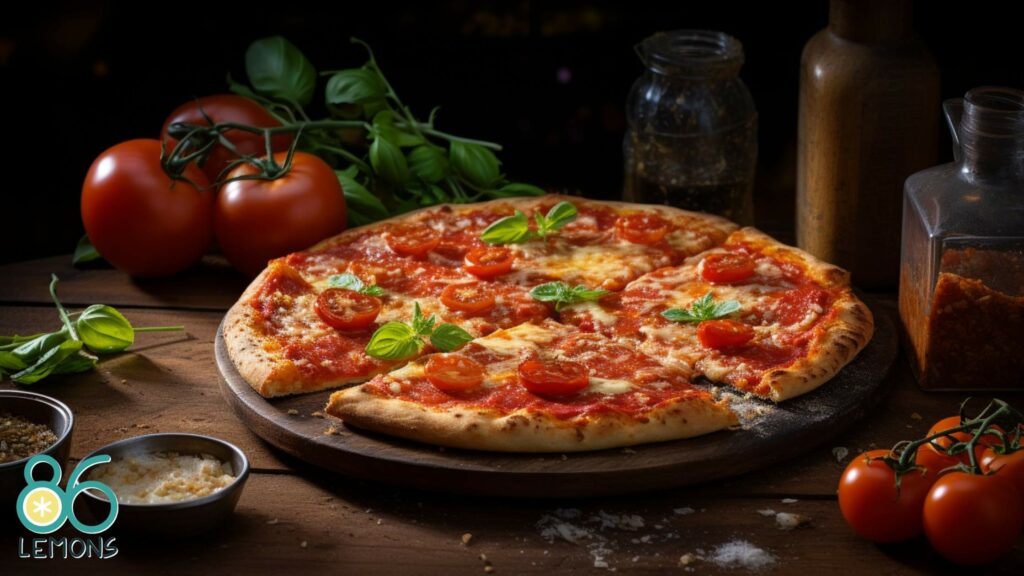
In your culinary travels, you’ll find that marinara sauce is a beloved staple in Italian cooking and has been creatively tailored by global cultures. Now, let’s dive into how this versatile sauce plays a role in different cuisines.
Marinara in Italian Cuisine
As you might know, Marinara sauce is a cornerstone of Italian cuisine, particularly from the Naples region. Authentic marinara often features San Marzano tomatoes, renowned for their sweet flavor and low acidity, making them perfect for sauces.
Alongside a blend of fresh herbs like basil and oregano, these ingredients combine to create a simple yet delightful accompaniment to pasta, pizza, and more.
Adaptations Around the Globe
Around the world, chefs and home cooks customize marinara sauce to suit local tastes, incorporating regional ingredients and creating unique variations. You may find it spiced up with local chilies or sweetened with indigenous fruits in some places.
The beauty of marinara sauce lies in its versatility; whether it’s the base for ratatouille in France or a spicy curry in India, the sauce can be easily adapted to align with the flavor profiles of world cuisines.
Frequently Asked Questions
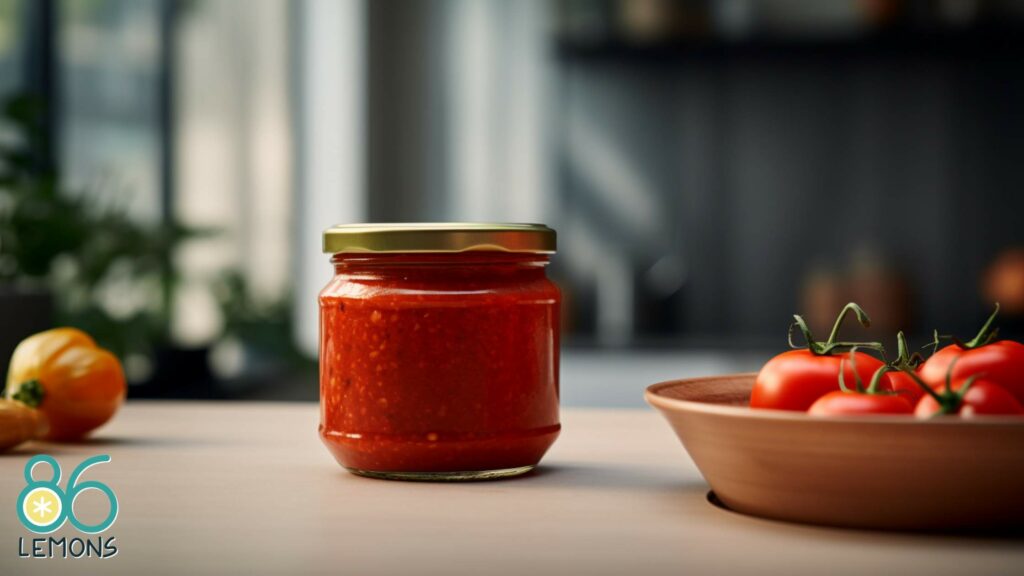
Explore this section to find answers to some common queries about marinara sauce and its compatibility with a vegan lifestyle.
Common Queries About Veganism and Marinara
Q: Can marinara sauce be included in a vegan diet?
A: Absolutely! Traditional marinara sauce is typically vegan-friendly, as it’s made with simple ingredients like tomatoes, garlic, and herbs.
Q: What ingredients might make a store-bought marinara sauce not vegan?
A: Some store-bought sauces may contain non-vegan ingredients like dairy. Always check the label for ingredients like cheese or cheese flavors to ensure your marinara is vegan.
Q: How can I enhance the taste of vegan marinara sauce using spices?
A: Boost your marinara by adding savory spices such as onion powder, garlic powder, and red pepper flakes. A pinch of ground black pepper also works wonders.
Q: Can I use marinara sauce with leftovers?
A: Certainly! Marinara sauce is incredibly versatile. Use it to refresh the taste of your leftovers, whether tossing it with pasta or drizzling it over roasted vegetables.
Q: What’s the best way to store homemade marinara sauce?
A: Store your homemade marinara in an airtight container in the refrigerator for optimal freshness. It can usually keep well for up to a week.
Q: Is adding sweetness to marinara sauce with maple syrup appropriate for a vegan diet?
A: Yes, maple syrup is a plant-based sweetener and can add a subtle sweetness to your sauce, making it even more delightful.
Q: Can I use an immersion blender to smooth my marinara sauce?
A: Absolutely, an immersion blender is a great tool to achieve a smooth texture in your sauce, just ensure you blend to your desired consistency carefully.
Expert Tips and Tricks
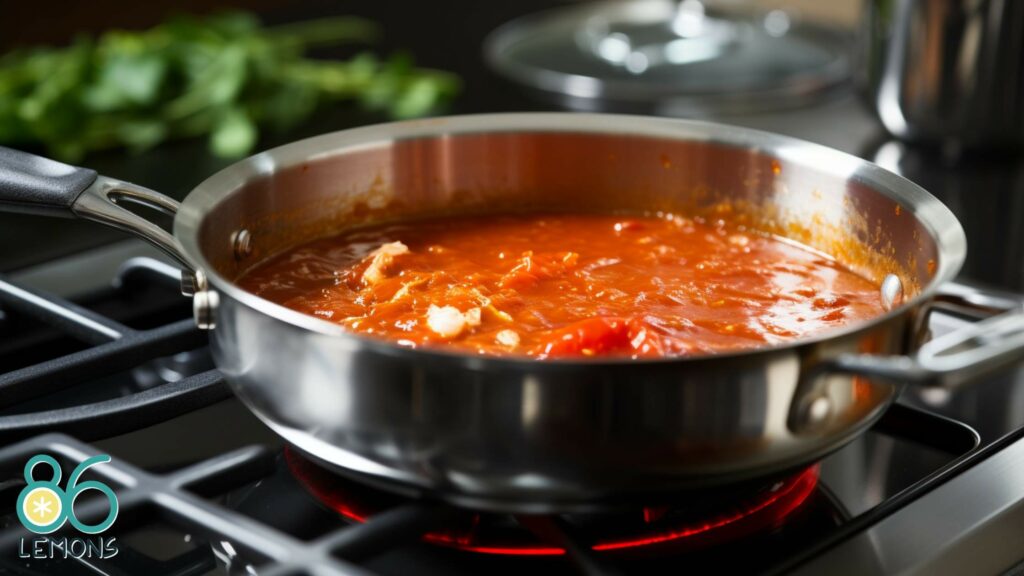
Certain tweaks and additions can make a difference in the flavor profile when crafting a vegan marinara sauce. It’s all about finding the right balance of ingredients to achieve that traditional taste.
Chef’s Recommendations
- Opt for extra virgin olive oil for an authentic taste due to its robust flavor and high quality. Just a tablespoon can enhance the richness of your marinara sauce.
- Incorporate a combination of fresh herbs like basil and oregano to infuse your sauce with aromatic depth. Fresh herbs tend to give a brighter flavor compared to dried ones.
Enhancing Flavor Without Compromise
- Incorporate a pinch of red pepper flake to add a subtle heat without overshadowing the tomato base. It’s a simple way to add complexity to your sauce.
- Don’t shy away from a variety of spices. A dash of dried oregano or thyme can introduce an earthy undertone that beautifully complements the tomatoes. Remember, even as you opt for vegan ingredients, you can still achieve a flavorful and rich marinara sauce with the right combination of vegetable oil and spices.
The Cultural Significance of Marinara
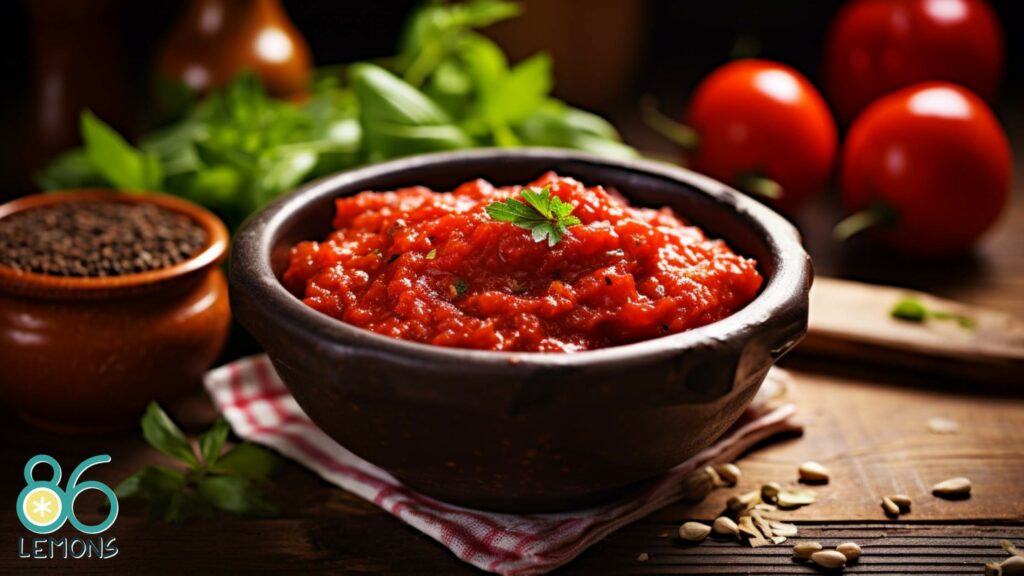
Marinara sauce has woven its way into the fabric of culinary tradition, becoming more than just a simple condiment. It’s a symbol of comfort and familiarity in many kitchens around the globe.
Marinara Sauce in Popular Culture
You’ve likely seen marinara sauce featured at the heart of many iconic scenes in film and television, signifying its place in popular culture. The sauce your favorite on-screen Italian restaurant adds to spaghetti makes the character’s dinner look inviting.
One such example of this is the pasta sauce from the movie ‘Goodfellas,’ which, to this day, still incites viewers’ mouths to water.
Cooking shows often highlight the simplicity and versatility of marinara, demonstrating how it can be the base for a variety of dishes or a comforting meal on its own. Such appearances echo its standing as a beloved element in both everyday meals and gastronomic ventures.
Final Thoughts
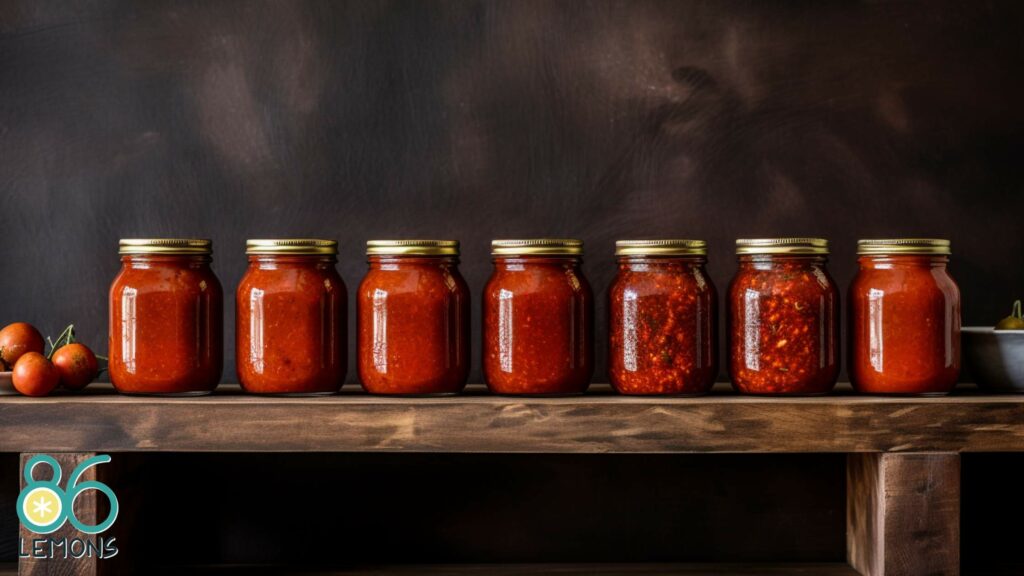
When opting for marinara sauce, you’re likely choosing a vegan-friendly option. Marinara sauce typically consists of tomatoes, garlic, onions, and herbs—all plant-based ingredients. It’s a go-to choice for topping your pasta or pizza with a clear conscience if you adhere to a vegan diet.
However, vigilance is key when selecting a store-bought option. Always check the ingredients list for hidden non-vegan elements, such as cheese or meat-based flavorings, which can sometimes be included.
Try a homemade recipe or rely on reputable vegan brands to ensure your marinara sauce meets your dietary preferences.
With attention to detail, you can enjoy the rich, flavorful addition of marinara sauce in your cooking, confident in its vegan status. Remember, being informed is your powerful ally in maintaining a vegan diet.

